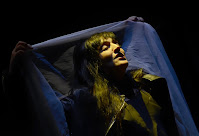by Sophocles
directed by Elena Bucci
with the collaboration of Marco Sgrosso
a Teatro Stabile of Brescia production
in collaboration with Le belle bandiere Company
and with the support of the Municipality of Russi
project and playwrights Elena Bucci and Marco Sgrosso
Antigone, Elena Bucci
Creon, Marco Sgrosso
Coryphaeus, Daniela Alfonso
Tiresias / Coryphaeus, Maurizio Cardillo
Ismene / Coreuta, Nicoletta Fabbri
Haemon / Coreuta, Filippo Pagotto
Guard / Coreuta, Gabriele Paolocà
light designer, Maurizio Viani - sound, Raffaele Bassetti - stage director, Giovanni Macis - lighting technician, Davide Cavandoli - costumes, Nomadea and Marta Benini - staging assistant, Alessandro Sanmartin - company coordinator, Federica Cremaschi - C.T.B. press office, Bianca Simoni - Le belle bandiere press office, Giulia Calligaro
___
Antigone by Sophocles astounds us with its clarity in dealing with a mythical theme and at the same time with its surprisingly simple and poetic timeless language, never losing the splendor of its direct communication.
The reasoning heart of Antigone is opposed to the inner conflict of Creon, and both these characters overly display their human vulnerability.
The unburied body of Polynieces - warrior, hero and traitor to a homeland infected by Oedipus' guilt - opposes the stubborn piety of Antigone to the inflexible monarch Creon: a mirror of the irreconcilable conflict between the law of the gods and the law of men.
So, other conflicts are created: visceral opposition between sisters, Ismene towards life, Antigone towards death; political opposition between King Creon and his rebellious son Haemon; Creon, blinded by his tyranny, ignores the ominous prophecy of the blind prophet Tiresias.
The theme of the blindness - symbolic as well as physical - starts by/from Oedipus personal drama and becomes an insurmountable obstacle that brings everyone to ruin, leaving doubt whether there is a way to overcome the pain that comes in every life.
During our investigation of the ‘classics’, we have tackled Shakespeare, Ibsen, Brecht and Goldoni. And now we have chosen to get in touch on the Greek tragedy for our need to face ethical and political thought, that seems to fade from day to day in this present age.
A core question in which we ask in tackling the work is the relationship between movement and dance, speech and singing, mask and face.
The actors travel from one level to another, acting in different styles not only within dramatic speech, but also in music and choreography.
Antigone's dramma highlights a dear and obsolete thought: no one can take away the freedom of choice not even the idea of utopia.
We find within this myth the eternal conflict between law and ethics, mercy and necessity, power and freedom, love and reason, lucidity and blindness, convenience and consistency. And the tragedy of Sophocles teaches us the importance of taking responsibility for our own actions.
Creon’s concept of an ideal government leaves very little room for opposition.
The Chorus is witness and judge, it moves and acts as one, while a web of sounds envelops the audience.
In the semi-darkness filled with restless shadows and sudden flashes of light, we imagine the body of Polynieces as a bloody reflection on the faces of living (people).
Seven chairs and five small stools divide and change the stage-room.
Moving in the shadows and in light reflections, the characters evoke sunlight and we feel the overwhelming effect of the words and prayers.
The ruins of an ancient city move us more than its reconstruction: we become aware of the differing images of our unknown origins.
Finally, Sophocles' words sound like a balm: they invoke wisdom, the key to happiness.
